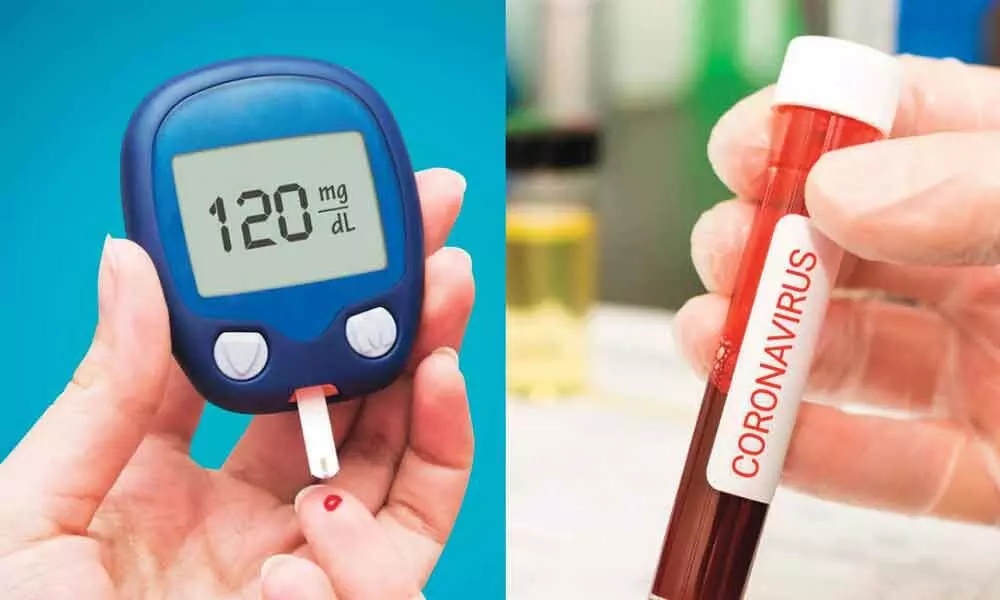'Diabetes raises Covid-19 mortality by 7 percent'

‘Diabetes raises Covid-19 mortality by 7 percent’
The World Health Organisation (WHO) says 8.7% diabetic population in India is in the age group of 20 and 70 years. Current Covid-19 pandemic has adversely affected diabetic patients.
Bengaluru: The World Health Organisation (WHO) says 8.7% diabetic population in India is in the age group of 20 and 70 years. Current Covid-19 pandemic has adversely affected diabetic patients. The doctors explain if heart/ kidney problems coexist with diabetes, risk is even higher and the situation could complicate if the patient is also infected with coronavirus.
"About 77 million people in India are either diabetic or pre-diabetic. Statistics tell us that diabetes has a 6-7% of Covid-19 mortality. Also, diabetes often exists with other comorbidities such as hypertension and heart diseases – each of them adds a certain risk. However, this does not imply that every diabetic will get into trouble. The fact is, if you have diabetes, then there is a 6% chance of getting into trouble because of Covid," says Dr Ravindra M Mehta, Senior Consultant & HOD - Pulmonology & Interventional pulmonology, Apollo Specialty Hospitals, Jayanagar.
"We have about 40-50% of patients admitted at our hospital, who are at a higher risk as they have diabetes. Diabetics also have a metabolic syndrome – they may be obese, have high blood pressure or cholesterol issues. When we give diabetic patients treatment for Covid-19, we have to give them steroids, and that elevates their sugar levels. This takes it to a higher problem because we then have to recommend higher doses of insulin, and the chances of infection will go up. These are the complicating factors of diabetes and Covid-19. Diabetes and Covid-19 have an interesting story at multiple levels - of co-morbidity causing higher statistical mortality, co-morbidity complicating care and co-morbidities existing with other comorbidities which can further accentuate the problem," he elaborates.
Dr. Karthik Prabhakar, HOD & Consultant – Diabetes and Endocrinology, Manipal Hospitals Old Airport Road explains, "Poorly controlled diabetes reduces body's defense/immune mechanisms and hence increasing the risk of getting severe infections. Blood glucose levels worsen significantly with Covid infection due to several reasons. Body's stress reaction to any severe illness including Covid can cause elevated glucose levels; studies indicate that this virus can also directly affect pancreas and impair insulin-release contributing to raised glucose levels."
"With high glucose levels, such patients, together with Covid-related problems, can also develop metabolic complications like Severe Hyperglycaemic state, diabetic ketoacidosis, electrolyte imbalances, etc., which all can lead to multiple complications and adverse outcomes," he adds.
Dr Prabhakar suggests diabetic patients should continue to follow a healthy diet, hydration and exercise, timely medications, finger-prick (Glucometer) glucose monitoring at home (if advised), and seek regular medical advice to ensure diabetes remains in good control.
"They should double-focus on general precautions like using masks correctly, hand-hygiene, social-distancing, avoiding crowded-places, going outside only if absolutely necessary, etc. In addition, family members &/or friends who stay with them/visit them should strictly follow Covid preventive measures. Lastly, if diabetic patients were to develop any symptoms suggestive of Covid-19, they would need urgent medical attention," he adds.
Commenting over India becoming a nation where the number of diabetic cases are high, Dr Prabhakar elaborates, "Sedentary life-style, high calorie diet, junk food, lack of exercise/physical activity, increasing screen-time, etc., when added to the pre-existing increased genetic risk in Indians, is resulting in a massive increase in the young diabetic population. Scientific research has shown that weight-loss by following a healthy active life-style can reduce the risk of getting diabetes – this concept should be emphasised and promoted since childhood – both at home and school."

